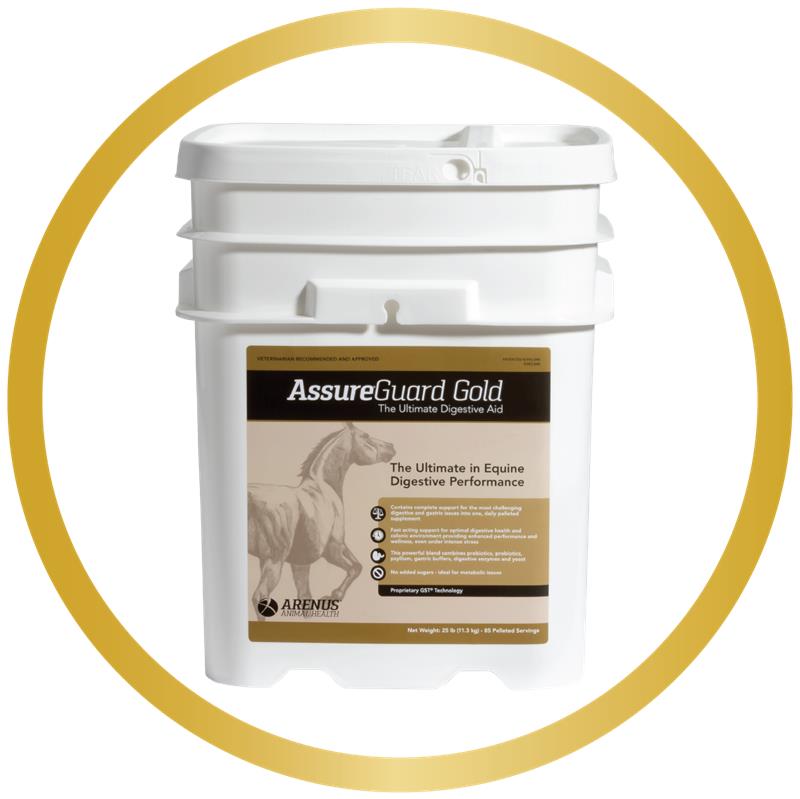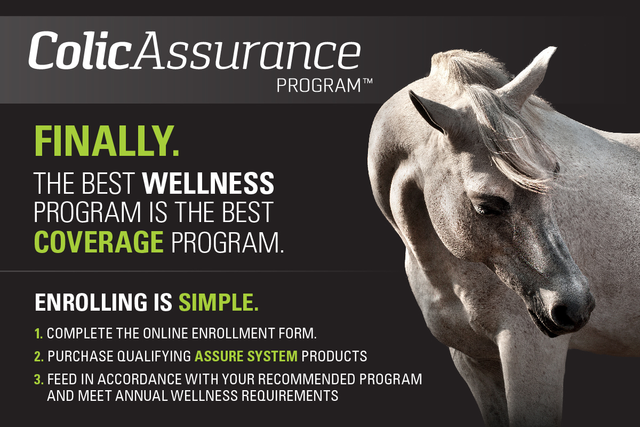
7 Must-Know Horse Colic Prevention Tips
Colic is one of the most distressing medical emergencies a horse owner can experience; it can come on quickly, is extremely painful and potentially life threatening. Luckily, with a good understanding of your horse's digestive system, you can help prevent colic in your horse. Below is an overview of how colic develops, along with seven simple ways to support your horse's digestive health.
What is Colic in Horses?
Did you know that horses have digestive tracts designed to consume high fiber forage throughout the day? This high fiber diet provides essential prebiotics in the horse's hindgut for optimal digestion. In addition, the constant walking and chewing that horses do in their natural habitat help support a healthy digestive system. In a barn environment, most horses are kept in a stall and fed twice daily (often diets high in carbohydrates and sugar), which puts stress on the equine digestive system and predisposes many horses to colic.
So, what is colic? Essentially, colic is abdominal pain caused by gas, intestinal impaction, a blockage, an intestinal twist, or other factors. It can range from mild to severe, and results from intestinal dysfunction, torsion, hernias, or ulcerations. A common trigger for colic is often weather changes or major diet or lifestyle changes, and, while the weather is a factor out of our control, we can control our horse's nutritional management.
According to The Horse, basic lifestyle management and nutrition is a key part of your colic prevention program.
Here are seven simple ways to support your horse's healthy digestion:
How Do You Prevent Colic?
- Your Horse's Feeding Regimen - We believe this is the best way to prevent colic in your horse. Keeping your horse out on pasture grazing high fiber forages most of the day, along with feeding small amounts of grain is ideal. Feed should be tailored to your horse's energy requirements for work, pregnancy, lactation or growth. If pasture is limited, be sure to provide a high-quality hay, split up into multiple meals throughout the day.
- Be Consistent - Any change in diet, whether it is a new batch of hay, a change in the type or amount of grain, or even changes in pasture (a very green pasture versus dryer pasture), should be made gradually. Ideally, any changes should be made slowly, over two weeks, to allow the bacteria in your horse's GI tract to adjust.
- Ensure Clean Water is Always Available - Even mild dehydration can trigger impaction and cause colic. During the winter, ensure electric heaters are nearby and functioning properly to prevent freezing of water troughs.
- Steer Clear of Sand - The dreaded sand. Sand can be irritating to your horse's intestinal lining, and cause colic. Be extra careful to not let your horse overgraze on pastures rich in sandy soil and avoid feeding hay or grain on the ground.
- Deworm According to a Rotational Deworming Schedule - or as indicated by your veterinarian.
- Consider Fiber & Probiotics – Pre and probiotics are essential to the health of your horse’s GI system. These “good bugs” ensure the proper breakdown of your horse’s food and can help maximize nutrient absorption. An added source of high-quality fiber, such as psyllium, can be of benefit to colic-prone horses by promoting optimal hindgut performance. Feed your horse a veterinarian-recommended digestive aid, like Assure Guard Gold, that contains both live microbes and psyllium to help prevent ulcers, diarrhea, and support overall digestive health. Learn more about the benefits of psyllium and probiotics by reading our blog on digestive supplements.
- Get Peace of Mind with Colic Assurance – If your horse has recurring colic, consider joining a reputable colic reimbursement program. Arenus’ Colic Assurance Program provides peace of mind, along with medical and surgical reimbursements, if eligible. Additionally, the Colic Assurance Program offers up to $10,000 in lifetime reimbursements and is relied upon by many horse owners. Learn more about the program by clicking here.

According to the AAEP, colic remains the number one killer of horses. As scary as that statistic is, colic is not impossible to prevent or treat. With a good preventative plan in place, you can minimize the chance for digestive distress in your horse.
Need help finding the right digestive aid? Contact our equine nutritionist, Brady Karren, to find out if Assure Guard Gold and the Assure line of products are right for your horse. Remember, as with any serious medical condition, it is important to work with your equine veterinarian before you make changes to your horse's diet, supplements or exercise program.
There you have it; colic prevention tips straight from the horse's mouth. Now over to you! What protocols do you have in place to prevent colic? Have you tried Assure Guard Gold and seen results? Be sure to leave a review of your Assure Guard Gold experience here. And don’t forget to tag @arenushealth and use hashtag #AssureGuardGold this month in honor of Colic Awareness Month and share your favorite colic prevention tips with us. We look forward to reading them!


